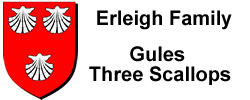Henry de Erlegh (I) – 5th Generation
Henry de Erlegh, who was the second son of William (II), inherited from his grandfather John (II) in 1230 [11,v.2,p.199].
In 1230 at the inquisition held by the Sheriff of Berkshire following the death of John (II), Henry was found to hold one knight’s fee of the king in “capite” in Erley, Berkshire, and the manor of Somerton-Parva or Somerton-Erleigh in Somerset in “capite” by serjeanty [7,p.157].
As the younger brother of John (III) who died without issue, Henry became the heir and made a fine of 20 marks for the relief of the lands which John(III) had held of the king in chief [7,p.157].
In 1236 Henry and his chaplain (also called Henry) were involved in litigation with the Wallingford Priory. The result was the establishment of the right of the Priory to 8s. pension from the tithes of Earley [1,v.3,p.223].
Henry married twice.
His first wife, Egelina de Candos, gave birth to Philip(I).
His second wife, Claricia or Clemencia, bore him two sons, John and Bartholemew [11,v.2,p.199].
Bartholemew de Erlegh had a son John [8,p.47] who may have lived in Berkshire.
Henry was sheriff of Dorset and Somerset [11,v.2,p.199]. He also held the ancestral lands in Kilkenny, Ireland; in 1247, he is listed as owing 1/2 and 1/4 knight’s fees for Nova Villa in Cullak in County Kilkenny [5,p.191,n.27]. Cullak or Coyllagh is Coillach, so-called from its woods, and is a large district that includes the parishes of Earlstown, Mallardstown, and Coolaghmore the last of which the name survives. Coolaghmore is apparently identical to the ancient borough of Coillach which was a part of the demesne lands of William Marshall.
About 1240 Henry made grants to Ralph Blund, Walter Blund, Henry de Hepene, and William, son of Henry de Waiwainestone (Owenstown) of land in Villa Wawany (Owenstown), Kilkenny as his free men of Nova Villa (Newtown).
Ralph, Henry, and William were to pay 17s. 11d. and Ralph 1/2d. at Michaelmas, Ralph, Henry and William 8s. 11 1/2d. and Ralph a farthing (1/4d.). The consideratum was 100s. [29,v.1,p.41,n.92and93].
In 1260 Henry was one of the eminent men who were summoned to the Great Council or Parliament convened by the king in London [18].
In 1269, he witnessed several documents at Wells Cathedral, Somerset [24,v.2,n.99].
Also about this time he granted to William de Plessetis for homage and service, 9 acres of meadow in the manor of La Haymore, hundred of N. Petherton, Somerset, who was to pay, yearly, a pitcher of wine on St.Martin’s day [24,v.2,n.121].
Henry died in 1272, survived by his wife Clemencia [1,v.3,p.213].
